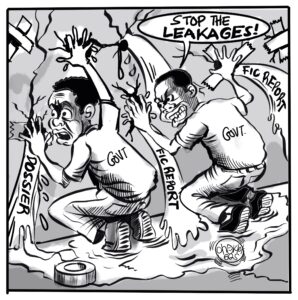DEPUTY MINISTERS IN GOVERNMENT: VALUE ADDITION OR VALUE EROSION?
But for the freeze on the portfolio, 44 Deputy Ministers could have been sitting pretty and holding office in 26 ministries in 2017.
Their presence in the government structure would have added at least K13, 291, 518.2 to the current budget presented to Parliament by Finance Minister Felix Mutati in November last year. But even that would have been just a modest estimate based on salaries and allowances contained in the Ministerial and Parliamentary Offices (Emoluments) Act, Chapter 262 of the Laws of Zambia.
The Act approves a monthly salary of K14, 929.83 to Deputy Ministers plus a Special Allowance of K3697.083 and K4091.5 for Utilities. They are also entitled to a Constituency Allowance, irrespective of the whether they are elected or nominated Members of the National Assembly. Those based in rural areas receive a Constituency Allowance of K3068.66; those in urban areas K2454.917. Therefore a deputy minister would earn a minimum of K25, 173.33 per month.
There are other allowances not outlined in the Act that come with the job, said a former Deputy Minister who spoke on condition of anonymity. He said throughout his tenure, he received a monthly office grant from the Ministry of Finance which was disbursed through his Permanent Secretary which covered entertainment, office expenses and ZANIS expense. The line of expenditure “ZANIS expenses” is not directly incurred by the minister, interviews with staffers of the Service revealed. They explained that if ZANIS reporters were assigned to cover a deputy minister, it was the host ministry that paid them transport refunds or, in the case of out-of-town or out-of-country travel, per diem. The monies they receive depend on whether the assignment is at district, provincial or national level.
One former Deputy Minister said position also entitled him to a personal vehicle assigned to him through the Ministry of Works and Supply transport pool which was sold to him at a cheaper price at the end of his tenure. Deputy Ministers also qualify for a utility vehicle from their host ministries.
Each of them has a personal driver who is a government employee as well as a maid and a houseboy who receive their salaries from the national treasury. Details about how much ministerial drivers and the servants assigned to them earn were difficult to get because as things stand, there is no law that compels government offices to disclose such information, even when disclosure is in the public interest.
When Deputy Ministers travel out of station or out of the country, they are entitled to allowances to cover full board and other incidental expenses, even when the trips are fully sponsored. According to some of those who have served in that portfolio before, there was no standard amount for international travel. They said the amounts in US dollars they received were calculated based on the destinations they were travelling to, as some places like Japan and the United Kingdom were considered more expensive than say, South Africa and Ethiopia.
Since the portfolio was frozen out of the government system, there have been calls within the National Assembly that Deputy Ministers be reinstated because they play a crucial role in the governance of the country, providing high-level policy support to ministerial functions.
But Finance Minister Mutati has refused to budge and bow to pressure, at least for now, insisting that there was no provision for deputy ministers in the 2017 budget and there was no chance of re-introducing the position in the current fiscal year, “regardless of persuasion from any quarter”. Speaking in a post-budget discussion on 14 November 2016 organized by Deloitte Zambia, he said: “If we are going to be financially disciplined, let us not bring things into the budget that we did not plan for.”
Mutati said those agitating for their re-introduction should wait for the presentation of the 2018 budget. His response suggests that the chapter on the portfolio is not entirely closed and that there is still some possibility of their return in the future, funds allowing and depending on the health of the economy.
However, the possibility of this happening any time soon is one that the Patriotic Front’s Parliamentary Chief Whip Richard Musukwa has categorically rejected, insisting it is not part of the ruling party’s agenda. “The motion to re-introduce the position came from the floor of the House and was made by an independent Member of Parliament. Let me assure you that government wants to run a lean structure of Ministers and will not go against the wishes of the people,” he said on 12 November 2016.
But his assurances have done little to allay the fears of sectors of the public, including civil society activists and Opposition politicians in the House and outside it, that the portfolio if Deputy Ministers is still very much a part of the ruling party’s political agenda. One of the most ardent critics is a group led by Sara Longwe calling itself Civil Society Constitution Agenda. In a statement dated 13 November 2016, it echoed the resolutions made by the Technical Committee drafting the Zambian Constitution and rejected, among other things, the reintroduction of the portfolio of Deputy Ministers on grounds that it was unconstitutional and wasteful.
A month earlier, the Forum for Democracy and Development expressed a similar position in a press statement regarding the inclusion of Deputy Ministers in Cabinet. In it, the party called on President and the PF to stop what it said was a breach of Article 49 of the Constitution of the Republic of Zambia which reads: “There shall be a Cabinet which shall consist of the President, the Vice President and Ministers.”
The FDD’s statement came in the wake of statements President Edgar Lungu made on 17 February 2015 in that regard when he swore in Professor Nkandu Luo as Gender and Child Development Minister along with 29 Deputy Ministers. He said he would engage the Vice President Inonge Wina and Cabinet Office on how to integrate Deputy Ministers into Cabinet meeting for them to effectively discharge ministerial functions in the absence of substantive office holders. The President said he would also engage Parliament to identify which Standing Orders need to be amended to allow Deputy Ministers to participate effectively in the House.
His reasons—in his own words: “What I have seen is that there is no co-ordination between the Minister and his deputy. The Minister is usually working alone but it should come to an end. It is important for them to be part of Cabinet proceedings for them to work hand in hand with Ministers because they both serve the interests of citizens. We are trying to work out modalities in Cabinet which will allow our Deputy Ministers to share in the proceedings of Cabinet.”
It is not known whether his experiences as a Deputy Minister in the Office of the President in President Michael Sata’s government in 2011 informed his decision. In any case, on Monday, 19 October 2015, President Lungu chaired the first-ever Cabinet meeting with Deputy Ministers and 10 Provincial Ministers in attendance at Government Complex.
The event was widely criticized by many pockets of civic and political interest, including by National Restoration Party (NAREP) President, Elias Chipimo who raised concerns about the ineffectiveness of meetings with such a large number of attendants. “The role of a Deputy Minister under our laws is more based on partisan politics than national interest. A Deputy Minister does not have any powers to stand in for a Minister in Cabinet but only serves as a speech reader and meeting attendee when the Minister is unavailable,” he said in a statement issued two days after President Lungu held the Cabinet meeting at Government Complex instead of at State House.
Interestingly, while critics of the inclusion harped on the unconstitutionality of it all, few took time to reflect on the cost involved in having nine Provincial Ministers from out of town travel to Lusaka once a week to attend a meeting where their presence was not really required.
The whole issue raises a critical question about cost-benefit and about the value Deputy Ministers bring to ministerial operations and functions as well as to governance on a broad national scale. All things considered, the question about whether the quality of governance in Zambia is enhanced by the portfolio of Deputy Minister or eroded by it can best be answered only if the facts as well as the figures prove that the end justifies the means.
Story by the ACA Fact Checking Unit
























